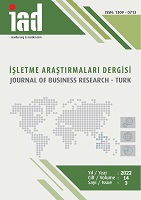Personel Güçlendirmenin Örgütsel Vatandaşlık Davranışına Etkisi: Yapısal Eşitlik Model Analizi
Effect of Employee Empowerment on Organizational Citizenship Behavior: Structural Equality Model Analysis
Author(s): Murat Korkmaz, Mahmut ÖzdemirSubject(s): Labor relations, Social Theory, Sociology of the arts, business, education, Human Resources in Economy, Socio-Economic Research
Published by: Orhan Sağçolak
Keywords: Employee Empowerment; Organizational Citizenship Behaviour; Structural Equality Model;
Summary/Abstract: Purpose – Employee empowerment is seen among the sources that have an effect on the organizational citizenship behaviour of the employees within the framework of the literature. Therefore, it is thought that as employee empowerment increases, organizational citizenship behaviours will also increase. From this point of view, it is aimed to examine the effect of employee empowerment on organizationalcitizenship behaviour in this study. Design/Methodology/Approach - The sample of the research consists of a total of 405 employees working within the scope of the Turkish Republic State Railways (TCDD) in Ankara. Data were collected using 5-point Likert type scales and they were analysed by applying quantitative data analysis method. Demographic distributions, reliability analysis and correlation analysis were performed using the SPSS 23.0 package program. Confirmatory factor analysis and structural equation model analysis were analysed using the AMOS 22.0 package program. Findings – When the findings obtained from the research were examined, it was determined that employee empowerment has a statistically significant and positive effect on organizational citizenship behaviour (standardized β=0,808, p≤0,05) and its sub-dimensions as altruism (standardized β=0,764, p≤0,05), civic virtue (standardized β=0,566, p≤0,05), kindness (standardized β=0,791, p≤0,05), sportsmanship (standardized β=0,402, p≤0,05) and conscientiousness (standardized β=0,783, p≤0,05). Discussion – It was seen that the research model and hypotheses created within the framework of the literature were confirmed according to the findings and results of the analysis. Changing management understandings in parallel with today's conditions accept the sharing of power with personnel as the basic principle of organizational success. Organizations where delegation of authority is given with this power sharing, organizations where the level of participation in decision-making processes is increased, organizations with regular feedback systems and organizations with a high level of awareness about the importance of education and developments achieve success. For this reason, practices that will strengthenthe personnel are of great importance for the managers who expect the personnel to display extra role behaviours voluntarily in a way that will contribute to the organizational goals.
Journal: İşletme Araştırmaları Dergisi
- Issue Year: 14/2022
- Issue No: 3
- Page Range: 2342-2353
- Page Count: 12
- Language: Turkish

